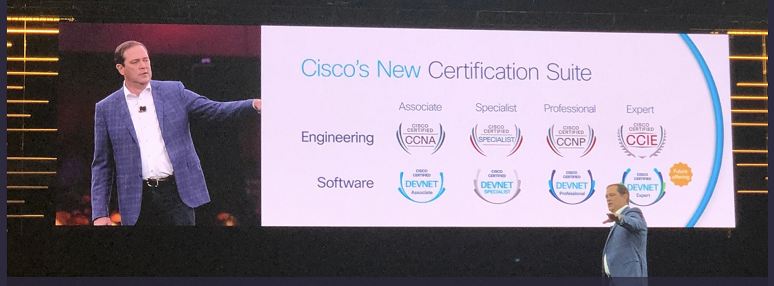At Cisco Live last week, Cisco
announced the first major change to its certification program since its inception in 1993.
The certifications, which include the Cisco Certified Network Associate (CCNA), Cisco Certified Network Professional (CCNP), and the highly vaunted, advanced Cisco Certified Internetwork Expert (CCIE), are technical in nature and designed to measure a professional’s skill level in building, running, and maintaining Cisco networks. A single CCNA certifies individuals to work in networking teams, while CCNP and CCIE has different concentrations, such as CCNP Enterprise, CCNP Data Center, and CCIE Security -- all engineering-focused. Now, however, Cisco has added a software track to complement these.
The new DevNet certifications comprise the following levels:
Cisco Certified DevNet Associate -- For developers who have one or more years of hands-on experience in creating or maintaining applications. The certification validates the core knowledge of Cisco platforms, applications, and APIs. This is equivalent to the CCNA.
Cisco Certified DevNet Specialist -- For developers who have three to five years of experience in the areas of application development, operations, security, or infrastructure. This confirms the knowledge and skills required to work in an environment focused on continuous delivery of applications and services using Cisco platforms. This is the software equivalent of the Cisco Certified Specialist. Developers can earn certifications in the following areas:
- Enterprise automation
- Collaboration automation
- Data center automation
- Service provider automation
- Security automation
- DevOps automation
- Webex solutions
- Internet of Things (IoT)
Cisco Certified DevNet Professional -- This is for developers who have at least three to five years of experience in designing and implementing applications. Once developers have earned a Specialist certification in one of the concentration areas listed above, they can write to Cisco Core API Platforms and APIs. The Specialist certification combined with the core will earn the developer the DevNet Professional certification.
This certification is comparable in skill level to CCNP and, as with DevNet Specialist, developers can earn more than one certification.
A fourth exam, the Cisco Certified DevNet Expert, is on tap. This certification will verify a skill level comparable to CCIE, but Cisco has yet to release details of this program.
I’m expecting the new DevNet certifications to be well-received. Over the years, Cisco has added software skills to the engineer programs, but not enough to satisfy many test takers. Cisco has told me that adding more software elements would mean taking out engineering topics to keep the exam from becoming too long. Yet all of the current technical topics are critical to validate skills, presenting it with a conundrum. Cisco determined that creating DevNet certifications was the ideal way to provide a path to substantiate software skills without taking away technical validation.
IT pros can use a combination of certifications to develop skills they need for a number of new job types created over the past few years.
For example, a DevSecOps professional requires knowledge of both DevOps and security operations. The individual could earn a CCNP in security to confirm a high level of security knowledge, a DevNet Specialist certification in security to show understanding of how to automate security, a DevNet Professional in DevOps automation that demonstrates the skills required to deploy applications securely, and a DevNet Webex Specialist to confirm the skills needed to create chatbots that alert the SecOps team. A professional holding all these certifications would make for a very credible DevSecOps engineer. Another example is an IoT architect who would need a combination of Cisco CCNP in Wireless, DevNet Specialist in Security, and the DevNet Professional in IoT.
With such a wide range of options, the key is to put the right combination of skills together. I’d like to see Cisco address this further to help developers and engineers accelerate skills advancement.
The evolution of Cisco’s certification program certainly highlights the success that the DevNet program has had. In only a few years, Cisco has amassed more than 600,000 members as developers and network engineers look to expand their skill sets. DevNet has brought these two historically separate areas together into one community to create what Cisco calls the IT team of the future. In my opinion, that future is now.
At the event, Cisco also announced the DevNet Automation Exchange. This is a shared code repository to solve uses cases for network automation. From the mainstage, Susie Wee, Cisco SVP and CTO of DevNet, said the Automation Exchange guides teams through their automation journey with the following walk-run-fly methodology:
- Walk -- Get network visibility and insights. This enables use cases such as gathering telemetry and insights from production networks, and auditing to ensure ongoing security of the network.
- Run -- Activate policy and intent across different network domains. This enables use cases such as enabling network self-service operations that comply with security policies and operational guidelines.
- Fly -- Proactively manage applications, users, and devices with DevOps workflows. This enables use cases such as deploying applications in continuous integration and delivery pipelines while configuring the network in accordance with new application policies.
Of all the Cisco Live events I’ve been to -- more than 20, I believe -- I can confidently say this was the one with the biggest software flavor. All of the mainstage demos involved how to do things through Cisco’s software tools, such as DNA Center.
Over the years Cisco has struggled with its identity as it shifted to a software company. It seems Cisco finally understands that selling hardware is OK -- few companies sell more of it than it does, after all -- but the unique capabilities of the Cisco network are unleashed through software, much of which now lives in the cloud, and it’s this combination of hardware, software, cloud, and silicon that keeps Cisco on top.
The new certifications will help its engineer and growing developer base learn the skills to take advantage of Cisco software and the Automation Exchange will enable customers embrace automation without putting the business at risk.









